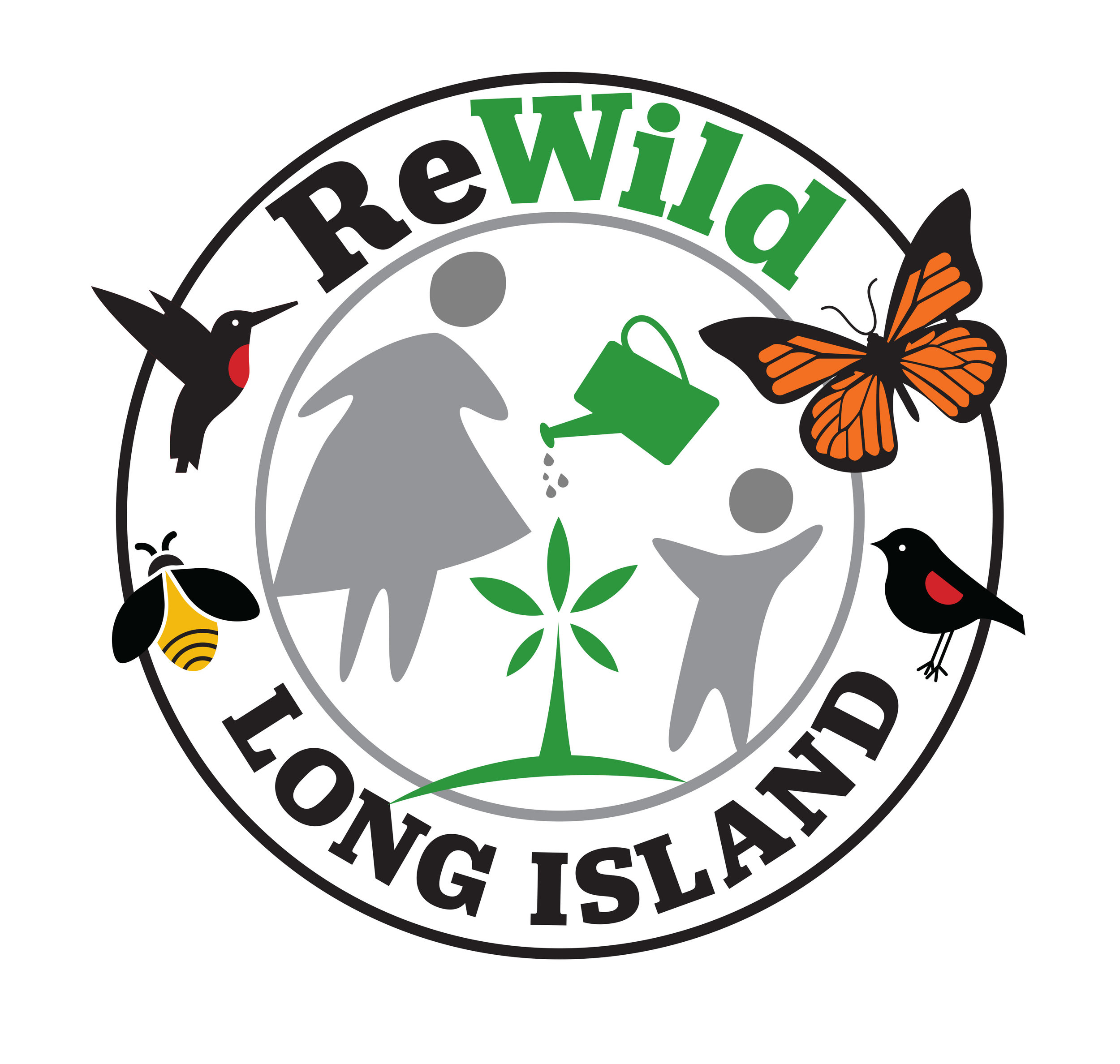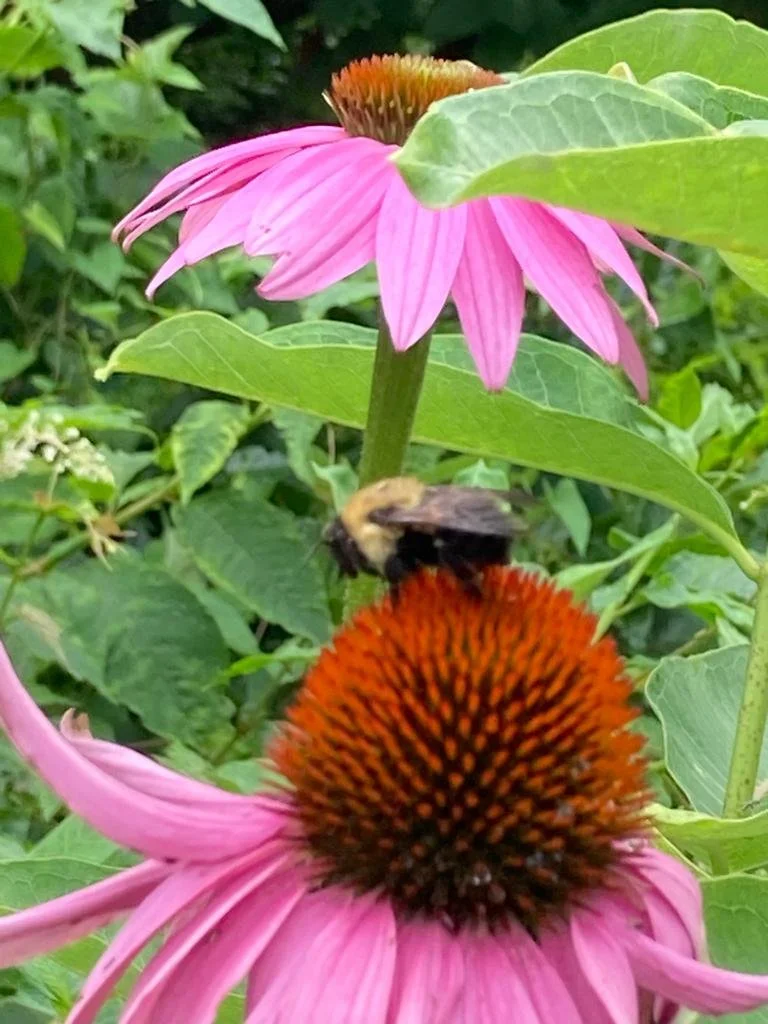The Flower Sleepers
About six years ago Valerie started a pollinator garden on a small strip of partially manicured land in front of her canal side tiny co-op. As with many that have planted natives, Val is bewitched by the colors, shapes and activity of an ecosystem that spings magically to life.
“Squeezing myself between pleats I snuggle within these petals of safety until the glare of daylight smooths me like a hot iron and I drift to the winds of my intuition floating on the thermal of a rare nothing to do day until I land on a mural I have yet to paint. “
Read on to discover her closely observed new world …
Read More
My Low-Tech Process for Germinating and Growing Native Perennials
We live in a miraculous world. A small seed will sprout and become a plant or a great tree. However, seeds have evolved to require specific conditions — temperature, moisture, season, etc — to germinate.
This blog post is about home germination of native plant seeds so you can propagate and grow your own native garden. Not only does this cost less, done right, it can be educational and fun!
The author of this blog, Catherine Halpern, fell in love with the process of germinating seeds. In this post, she breaks it down into easy steps for the winter!
Read More
Starting Kubecka Native Garden
A garden is a place of solace and connection with Nature. It is also a place for exploration and education. Three lifelong gardeners and recent Master Gardener SCCE graduates set out to plant and maintain a native garden in Huntington.
In this blog piece, Master Gardeners Alexandra, Carolyn, and Hope discuss how they were inspired to start and finish the Kubeka Garden project with a little help from ReWild Long Island.
Read More
Mindful May: Renewing Connections to Our Yards and Gardens
In May, ReWild Long Island celebrated “Mindful May,” a month in which gardeners reconnect with their gardens and with the rest of the natural world. We asked gardeners to send us their observations, reflections, and photos and to tell us about what they were doing to be mindful in their yards. The responses were beyond our expectations, not only in the number of submissions we received, but also in the joy, love, and beauty that these writers expressed. Some folks stopped mowing for the month, while others changed when or where they mowed. Some folks planted native plants or ripped out invasives. Others took time to observe the beauty of their gardens and experience the joy of seeing the insects, birds, and mammals who visited their gardens. These gardeners not only reconnected to the beauty of their yards but also enhanced and benefited the natural world in which we all live. Here are some excerpts from the submissions.
Read More
Garden With a Purpose: A Mindful May Observation by Perry Rubens
Perry’s backyard garden has room for vegetables, ornamental plants and now a variety of native plants that Perry selected in a site that he designed. He enjoys seeing the changes and learning what works, what doesn’t and how the garden provides ecological service to local pollinators. It’s a working progress.
Read More
Sustainable Garden Resources and Frequently Asked Questions
New and experienced ReWilders ask about resources around sustainable landscaping. Rather than try to recreate well-known national resources like wildflower.org, we have chosen to compile local answers relevant to Long Island. Sustainable landscaping is relatively new, and there is much to experiment and learn. Your land, your soil, your sun and water situation may dictate your success. In that light, we love to feature the experience of other rewilders on Long Island as the basis of what may (and may not) work for you.
If you have a story or experience to share, please send it to us. If you spot an error, please let us know. This faq is only as good as the community that informs us!
Read More
Easy No-Till Vegetable Gardens with Horticulturist & Landscaper Brian Zimmerman [Video]
This is a recording of a presentation by horticultural veteran and no-till expert Brian Zimmerman. Brian eloquently describes his own evolution and realization around the very many no-till techniques that add fertility and reduce weed pressure in gardens. This talk also features discussion of different cover crops, and provides a detailed list of downloadable resources on cover-cropping for Long Island.
The zoom presentation was hosted by ReWild Long Island on June 7th.
Read More
Know Your Long Island Mammals with Seatuck Biologist Mike Bottini [Video]
Know Your Long Island Mammals with Seatuck Biologist Mike Bottini
Join wildlife biologist Mike Bottini from Seatuck Environmental Association as he answers these questions and more.
Which mammals are native to Long Island?
How have their populations changed over time?
What’s the future looking like for mammals?
And learn how you can make their futures brighter by joining the Mammal Survey https://seatuck.org/long-island-mammal-survey/
Read More
Reflections on How My Garden Has Changed
Patty Collins is a retired cardiac anesthesiologist. She moved to East Hampton in January 2020 and started learning about native plants and pollinators. She stays active by volunteering for various organizations such as ReWild Long Island, Change Hampton, and Suffolk Alliance for Pollinators.
She reflects on her gardening journey from an ornamental garden in Illinois to learning about native plants and how individuals can help through small actions.
Read More
I Saw the Sign and It Opened My Mind
We may not notice everything in life, but some things catch our attention and make a big impact. Duong Vu reflects on her rewilding journey in this blog post.
Duong Vu was born in rural Vietnam. Her childhood memories consist of going to the field with her mother, hand-pollinating corn stalks, harvesting peanuts, soybeans and the big Autumn rice harvest. She relocated to Dix Hills four years ago and started her own little garden. She loves watching plants grow.
Read More
Soil Secrets & Mulch Murmurs with Tamson Yeh [Video]
In our yards, SOIL provides the foundation and MULCH supports that foundation. Without a solid foundation, the house will fall down.
Learn how you can grow your best garden ever by building healthy soils. Decode your soils with Tamson Yeh from Cornell Cooperative Extension of Suffolk County, NY. Tamson holds a PhD from the University of Rhode Island in Plant Science, Specialization Turf Insects and Nematology.
Read More
“My Lawn Came Alive": A No Mow May Reflection
“When we decided not to cut the grass in May of last year, our lawn suddenly became alive with visiting beneficial insects, bees and butterflies. By not mowing for one whole month, we saved time, energy and water.”
Dianna Facci, a Port Washington resident and rewilder, reflects on her personal observations of what happened when she stopped mowing for a month. Read Dianna’s experience and send us your own with pictures… Disaster or Revelation? You decide…
Read More
Soil Biome and Your Carbon Footprint
We live in a miraculous world. Take the ground we walk on. A cup of healthy soil can contain more organisms than there are humans on Earth. The soil biome makes plant life possible, and, in turn, plants feed the biome. It’s a complex and mutual relationship. We are part of this mutuality. Without it, we wouldn’t be here.
In this blog post, Len Green, a long time environmentalist and currently ReWild Board Member, reflects on the intricate relationship between the organisms in the soil and greenhouse gases in the air. Learn more about how the earth and the sky are interconnected through native plants.
Read More
How to Maintain Your Spring Garden: Best Methods to Benefit Birds, Bees & Other Wildlife with Anthony Marinello, Dropseed Native Landscapes [Video]
As spring approaches, what can you do in your garden to support critical habitat? When can you safely move the leaves that have protected the bees and caterpillars and lightning bugs that have overwintered in your soil? And what is the best timing for cleaning out last year’s plant stems? Learn how your actions, from initial design to seasonal maintenance, support beneficial wildlife.
Read More
Want Butterflies in Your Yard? You Need Host Plants! [Video]
Have a fascination for butterflies that are native to Long Island? You will not see them if you have conventional landscaping like lawns or concrete. But with just a few strategically selected native plants, you will attract and help butterfiles to your home.
Butterflies’ nutritional needs evolve throughout their life cycle. Join Kim Simmen to learn about metamorphosis and how you can attract beautiful butterflies to your Long Island, NY yard with a few strategically selected native plants.
Read More
BLING! Biodiversity of Long Island Native Gardens [Video]
A Citizen Science Project Right in Your Yard David LaMagna
If you build it, they will come! What wildlife are you helping to support on Long Island? Dave will share his journey into native garden biodiversity from this summer and teach you how to participate in the exciting new project.
Also don’t forget to follow @NativeEcoNHS on Twitter and nativeeco_nhs on Instagram.
Read More
Fall In Love With Mason Bees: A ReWild Talk by Laura Klahre [Video]
Learn how to raise Blue Orchard Mason Bees successfully in your own yard from expert bee rancher Laura Klahre of Blossom Meadow Farm. The talk will cover the mason bee’s life cycle, habitat requirements, equipment needed, optimal placement of the bee cottage, and maintenance throughout the year including cocoon deployment, harvest and hibernation.
Mason bees are easy to keep spring pollinators that will add fun and excitement to your spring outdoor activities
Read More
Neonics: The Ugly Truth [Video]
This presentation covers the following:
Drive mass losses of birds, bees and other wildlife
Threaten our health
Enter our own gardens
Contaminate water and soil
And also get to learn on how you can impact pending legislation the New York Birds & Bees Protection Act-to eliminate the majority of neonics entering our environment.
Read More
Leap of Faith: A ReWild Story
Francesca Zahner, a Port Washington resident and beginning rewilder, benefitted from the Town Of North Hempstead rebate program that provided up to $300 for planting natives. She had long wanted to tear up her lawn and replace with a native garden. Francesca created a design and procured plants with the help of ReWild Long Island. In this carefully written blog. she documents the step by step process of creating a new rewild garden. Learn from her success … and mistakes!
Read More
ReWild Seeks Garden Consultant For New Program
ReWild Long Island is looking for a hands-on gardening/landscaping professional to help design, create and maintain newly rewilded spaces and educate volunteers on sustainable gardening practices. The Consultant will be required to drive to these gardens and work hands-on to assess conditions, prepare the earth, design and plant gardens and install irrigation, as well as instruct volunteer helpers on their maintenance. Read about the ReWild Gardens Program here. Contact admin@rewildlongisland.org if you have any questions about the role.
Read More







![Easy No-Till Vegetable Gardens with Horticulturist & Landscaper Brian Zimmerman [Video]](https://images.squarespace-cdn.com/content/v1/5d26169d479c6d0001c989aa/1686602940352-OFA04CIFXORLLMIK4924/230607_picture+from+BrianZimmerman.jpg)
![Know Your Long Island Mammals with Seatuck Biologist Mike Bottini [Video]](https://images.squarespace-cdn.com/content/v1/5d26169d479c6d0001c989aa/1685412366600-1U3KH0SFC4K54J9IYVLP/230516_MikeBottini_LongIslandMammals_YouTubeThumbnail.png)


![Soil Secrets & Mulch Murmurs with Tamson Yeh [Video]](https://images.squarespace-cdn.com/content/v1/5d26169d479c6d0001c989aa/1682838456289-ZHMIGR6PKLU320BWEYR7/230406_ThumbnailHorizontalwithText_SoilSecretsDirt_TamsenYehCCE.png)


![How to Maintain Your Spring Garden: Best Methods to Benefit Birds, Bees & Other Wildlife with Anthony Marinello, Dropseed Native Landscapes [Video]](https://images.squarespace-cdn.com/content/v1/5d26169d479c6d0001c989aa/1680287883333-IYZNUB5PX9H7UUZHE694/230329_Spring_Marinello_NoDate_useAFTERevent+%281%29.png)
![Want Butterflies in Your Yard? You Need Host Plants! [Video]](https://images.squarespace-cdn.com/content/v1/5d26169d479c6d0001c989aa/1679333330224-KHKKN27TSKE5W1K4HFZ0/230310_Kim_ButterflyHostPlantsFinal+%281%29.png)
![BLING! Biodiversity of Long Island Native Gardens [Video]](https://images.squarespace-cdn.com/content/v1/5d26169d479c6d0001c989aa/1679331753894-CLSX9P15B0KNQI6F763E/230308_Bling.jpg)
![Fall In Love With Mason Bees: A ReWild Talk by Laura Klahre [Video]](https://images.squarespace-cdn.com/content/v1/5d26169d479c6d0001c989aa/1677125649021-3N9U2NW74X60HG1JO9ZI/Mason+Bee.jpg)
![Neonics: The Ugly Truth [Video]](https://images.squarespace-cdn.com/content/v1/5d26169d479c6d0001c989aa/1677001284842-FKOWL019O1XX98DDIH5W/image003.jpg)

